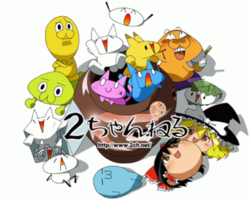2channel
 |
|
|
Type of site
|
Textboard |
|---|---|
| Available in | Japanese (some parts are in English) |
| Owner | |
| Created by | Hiroyuki Nishimura |
| Revenue | ¥100 million/year |
| Slogan(s) | 「ハッキング」から「今晩のおかず」まで (From "hacking" to "side dishes for tonight's dinner") |
| Website | 2ch.net |
| Alexa rank |
|
| Commercial | Yes |
| Registration | Optional, US$33.00/year |
| Launched | May 30, 1999 |
| Current status | Active |
2channel (2ちゃんねる ni channeru?, 2ch for short) is a Japanese textboard. In 2007, 2.5 million posts were made every day. Launched in 1999, it has gained significant influence in Japanese society, comparable to that of traditional mass media such as television, radio, and magazines. During 2008 the site generated an annual revenue upwards of ¥100 million for its founder Hiroyuki Nishimura. The website was previously operated under Packet Monster Inc., a company based in Chinatown, Singapore, between 2009 and 2014. It has been described as "Japan’s most popular online community, with around ten million users accessing it each day."
The name "2channel" is allegedly a reference to how RF modulators, commonly used for connecting earlier-generation game consoles (such as Family Computer by Nintendo) to television sets, default to VHF channel 2 in Japan.
2ch was opened on 30 May 1999 in a college apartment in Conway, Arkansas on the campus of University of Central Arkansas by Hiroyuki Nishimura. At the time, 2channel served as the successor to an earlier anonymous textboard known as . Since 2channel's servers were located in the United States, the website enjoyed a greater degree of immunity to legal action from within Japan, in comparison to its predecessors.
In 2009, Hiroyuki transferred ownership of the website to Packet Monster Inc., a company based in Chinatown, Singapore, while remaining as an administrator. However, due to Japanese bystander laws which state that a website holds full responsibility for the regulation of its community in the event that it becomes accessory to a crime, Hiroyuki was charged with promoting the sale of narcotics on December 20, 2012. Later on August 24, 2013, the Tokyo Regional Taxation Bureau declared in a tax audit that Nishimura failed to declare 100 million yen worth of website revenue which is subject to income tax.
...
Wikipedia
